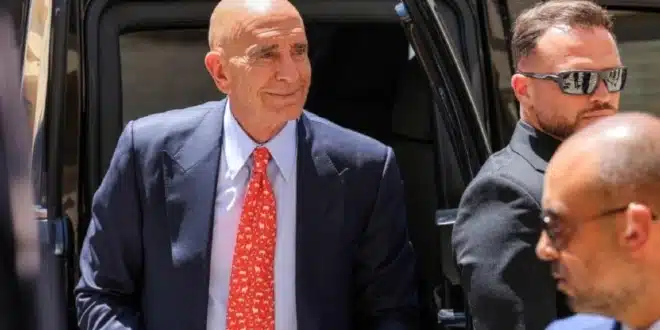Lebanon’s top political leaders have reached a unified position ahead of a second visit by U.S. envoy Tom Barrack, expected before July 10. The discussions, led by President Joseph Aoun, Parliament Speaker Nabih Berri, and Prime Minister Nawaf Salam, have reportedly resulted in consensus on a draft response to proposals presented by the United States regarding Hezbollah’s disarmament and a potential ceasefire framework with Israel.
Lebanese Leadership Finalizes Draft Response
During a meeting held in Baabda on Monday, representatives of Aoun, Berri, and Salam reviewed and agreed on a joint position. The agreed-upon draft paper, which was later approved by all three leaders, also received input from Hezbollah’s leadership during consultations with Speaker Berri. The unified message centers on Lebanon’s willingness to move forward with discussions on arms regulation, but only under conditions that remove ongoing military pressure from Israel.
According to sources familiar with the discussions, the Lebanese side will ask the U.S. to press Israel for a meaningful ceasefire. This step is viewed as essential for creating a political environment that would allow Lebanon to de-escalate tensions and address Hezbollah’s internal concerns. Those close to the talks acknowledged that Hezbollah is looking for credible guarantees to explain its potential shift in policy to its support base, particularly regarding any moves to relinquish weapons.
Hezbollah’s Position and Conditional Flexibility
Hezbollah’s leadership has expressed interest in pursuing guarantees that frame any disarmament as directly tied to key national outcomes, such as the withdrawal of Israeli forces from Lebanese territory and the release of Lebanese detainees. These assurances are considered essential for Hezbollah to justify any concessions on arms to its broader constituency.
Presidential sources view Hezbollah’s inquiries about post-conflict reconstruction and timelines for Israeli withdrawal as indicators of softening resistance toward arms regulation. These developments mark a notable change, as Hezbollah has historically rejected the inclusion of its arsenal in Cabinet-level discussions.
No Need for New Cabinet Vote, Leaders Say
Local media have reported that Aoun, Berri, and Salam are in agreement that the current government, led by Najib Mikati at the time of the original ceasefire accord, had already accepted the terms of that agreement. As a result, they see no need to convene a special Cabinet session to reexamine the U.S. document. Lebanese officials have also stated that the country should not offer new commitments until Israel’s next steps are clear.
The agreed Lebanese position to be conveyed to the U.S. administration emphasizes that any move toward regulating arms must be met by reciprocal Israeli actions: a full withdrawal from Lebanese territory, a cessation of daily military operations, and the release of prisoners.
Regional Pressures and External Signals
Despite Lebanon’s internal alignment, there are concerns that both the U.S. and Israel may seek to delay or reject the proposed settlement terms. According to some political observers, there is speculation that Israel might escalate military action in the near future, possibly through intensified airstrikes or expanded ground operations. These warnings are seen by some as attempts to pressure Lebanon into making additional concessions.
Meanwhile, other sources suggest that Iran may be signaling to Hezbollah and Berri a shift in strategic posture, possibly in favor of fulfilling the detailed provisions of United Nations Security Council Resolution 1701. This resolution, adopted in 2006, calls for the disarmament of all armed groups in Lebanon and the establishment of a weapons-free zone south of the Litani River.


